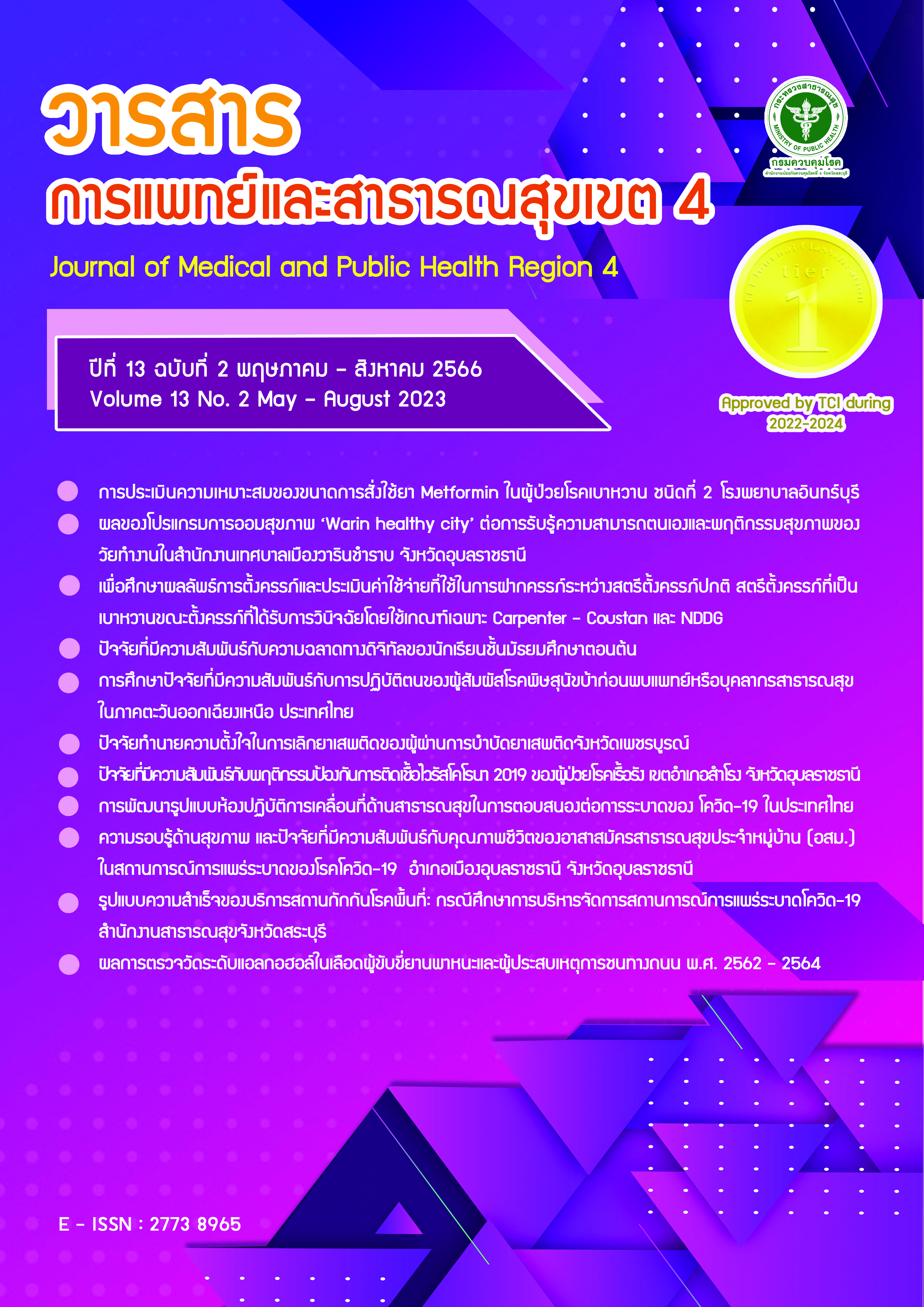Factors associated with Digital intelligence quotient among Lower secondary school students
Main Article Content
Abstract
Presently, Thai society is moving rapidly into a digital society, especially during the pandemic of COVID-19. Digital Intelligence Quotient (DQ) serves as a significant factor in helping the individuals adapt to the digital. The purposes of this descriptive correlational research were to describe DQ and examine its associated factors among lower secondary school students. The sample included 166 lower secondary school students of public schools located in Khok Charoen District, Lopburi Province. Simple random sampling was used to recruit this sample. Instruments for data collection consisted of questionnaires to gather data for general information, Digital Intelligence Quotient, metacognition, assertiveness, family Support, and teacher support. These questionnaires yielded Cronbach alpha of .85, .82, .91, .80 and .83, respectively. Data were analyzed by using percentage, mean, standard deviation and Pearson's correlation coefficient statistics. The study results showed that the level of DQ among this sample was in a moderate level (X̄ = 206.75, SD = 34.95). Correlational analysis found that the metacognition and assertive had high and positive relationships with DQ (r = 0.654, p<.01 and r = 0.669, p<.01). Whereas teacher support had a low and positive relationship with DQ with significant level of .05 (r = 0.159). From this study results, it is suggested that DQ essential to help young people lead a safe digital life. Encouraging youth to be assertive, metacognition and with proper support from teachers can help increase DQ.
Article Details

This work is licensed under a Creative Commons Attribution-NonCommercial-NoDerivatives 4.0 International License.
References
Thumthong B, Wannit P. Education in the Era of Digital Disruption and the Impact of the Covid-19 Situation towards Learning Management in Thai Educational Schools. The Golden Teak: Humanity and Social Science Journal [internet]. 2022 [cited 2022 Dec 1]. 28(3):1-13. Available from: https://so05.tci-thaijo.org/index.php/tgt/article/view/253118/175839
Ministy of Information and Communication Technology. Digital development plan for economy and society. Bangkok: Ministry of Information and Communication Technology. 2016.
Inthanon S. DQ Digital Intelligence [internet]. 3. Bangkok: the walk on clound publisher; 2563 [cited 2020 April 10]. Available from: http://cclickthailand.com/wp-content/uploads/2020/04/dq_FINAL.pdf (in Thai)
Konglap L, Satiantip U, Inthanon S, Sermsinsiri P. Fact Sheet Digital Intelligence and cyberbullying in young people [internet]. Bangkok: Child and Youth Media Institute. 2018. [cited 2020 may 1]. Available from: http://cclickthailand.com/fact-sheet (in Thai)
Zhu C., He T. Digital informal learning among Chinese university students: the effects of digital competence and personal factors. International Journal of Educational Technology in/higher Education [internet]. 2017. [cited 2020 Feb 10].14(44):1-19. Available from: https://educationaltechnologyjournal.springeropen.com/articles/10.1186/s41239-017-0082-x
Kapo A, Turulija L, Kacapor K, Bajgoric N. Teachers' Digital Competence Enhancing High School Students' Success: The Mediating Role of Pedagogocal Innovation and Entrepreneurship in Teaching. Proceeding of INTED2020 Conference 2 [internet]. 2020 [cited 2020 May 10]. 2(4):5721-30. Available from: https://www.researchgate.net/profile/Amra-Kapo/publication/340101842
Suikraduang A. The Causal Factors Influencing Digital Literacy of Grade 12 Students in the Northeast Region: Multilevel Structural Equation Model Analysis. Journal of Educational Measurement, Mahasarakham University [internet]. 2019 [cited 2021 Dec 22]; 25(2):296-312. Available from: https://so02.tci-thaijo.org/index.php/jemmsu/article/download/198002/167489/876195 (in Thai)
Hatlevik OE, Guomundsdottir GB, Loi M. Examining Factors Predicting Students' Digital Competence. Journal of Information Techmology Education Research [internet]. 2015 [cited 2020 May 10]. 14:123-37. Available from: http://www.jite.org/documents/Vol14/JITEV14ResearchP123-137Hatlevik0873.pdf
Roopleam T, Tayraukham S. Development of a Digital Intelligence Quotient Program for Elementary School Students. Journal of Humanities and Social Sciences Mahasarakham University [internet]. 2018 [cited 2021 Dec 25]. 37(5):42-53. Available from: https://hujmsu.msu.ac.th/Eng/pdfsplitE.php?p=MTU5OTAxNjExOS5wZGZ8NTEtNjI= (in Thai)
Koedsewan S. The Use of Metacognition to Develop Self-regulated Ability of the Second-year Vocational Certificate Students [dissertion of Master of Education]. Dhurakij Pundit University; 2015. (in Thai)
Suwannatrai S, Boonchai P, Udomsansewee L. Development of Creative Writing Ability, Aseertive Thinking Behavior and Attitude towards Creative Writing by Using the Multisensory Approach and Mild Mapping Technique of Prothom Suksa 3 Students. Journal of Curriculum and Instruction [internet]. 2009 [cited 2020 Dec 25]. 1(2):69-77. Available from: https://jci.snru.ac.th/ArticleView?ArticleID=722 (in Thai)
Yamwong P. A study of social support affect life satisfaction among Thammasat university students [dissertion of Master of Education]. Srinakharinwirot University; 2012. (in Thai)
Burn N, Grove S K. The Practice of Nursing Reseach: Appraisal, Synthesis, and Generation of Evidence (7th ed.). 2013. St. Louis,MO:Elsevier.
Wisitpongpun K, Boonkorkoer C, Yoonirundorn K. Factors affecting university students cybersecurity awareness. Science Journal Chandrakasem Rajabhat Univerity [internet]. 2022 [cited 2022 Dec 5]. 32(1):33-8. Available from: https://ph03.tci-thaijo.org/index.php/scicru/article/view/115/57 (in Thai)
Khaisri P, Pijitt K. Development of Instructional Model for the Student Teacher Using Research-Based Learning in Curriculum Development Couse to Promote the 21st Century Learning. Journal of Curriculum and Instruction[internet]. 2021 [cited 2022 Nov 15]; 13(38):149-58. Available from: https://jci.snru.ac.th/ArticleView?ArticleID=949 (in Thai)
Pengpit P. The factors relations the 21st century skills of undergraduate student’s Kasetsart University Kamphaeng Sean campus. Journal of education silpakorn university[internet]. 2020 [cited 2022 Oct 10]; 18(1):319-38. Available from: https://so02.tci-thaijo.org/index.php/suedujournal/article/view/191001 (in Thai)
Boonchakorn M, Singhwee C. Assertion, emotional quotient and coping with bullying styles of junior high school students at one of the secondary school in Bangkok metropolis. Journal of Social Sciences and Humanities [internet]. 2020 [cited 2022 Oct 10]; 46(1):146-73. Available from: https://kukrdb.lib.ku.ac.th/journal/JSSH/ search_detail/result/408632 (in Thai)
Thammasawas R. The Multi-level Cause Factors Affecting the Digital Citizenship of Lower Secondary School Students in Mukdahan Province [dissertion of Master of Education]. Mahasarakham University; 2021. (in Thai)
Kaewkaewpan W. The study of stress of teenage students studying in the Mathayomsuksa 6 of school under secondary educational service area office 10 in samutsongkhram province. Journal of Education Burapha University[internet]. 2021 [cited 2020 Oct 12]; 32(2):13-28. Available from: https://so02.tci-thaijo.org/index.php/edubuu/article/view/251319/169273 (in Thai)
Chotpitayasunondh V. An Investigation of the Antecedents and Consequences of ''PHUBBING'' How Being Snubbed in Favour of a Mobile Phone Permeates and Affects Social Life [Dissertation Ph.D. Philosophy], Kent at Canterbury
Phetdam J. Risk factors affecting deviant behaviors of Lower Secondary School Students: A case study of Nakhon Nayok province. Retrieved from Nakhon Nayok; 2011. (in Thai)


